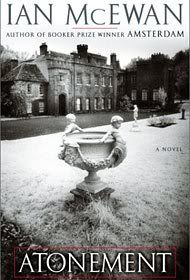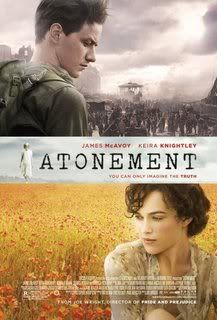Atonement: Novel to Film
By Therese Walsh | July 15, 2008 |
 I just turned my revision of Unbounded in to Elisabeth last night, and so this week it’s going to be about balance for me. Taking my dog for a few more walks. Going for a massage. Catching up on current events (Brangelina had their baby Saturday? Where have I been?). Finishing the paint job on my daughter’s room. Making tabbouleh salad. Reading Ann Aguirre‘s Wanderlust, which she so kindly sent to me. And watching a few good flicks.
I just turned my revision of Unbounded in to Elisabeth last night, and so this week it’s going to be about balance for me. Taking my dog for a few more walks. Going for a massage. Catching up on current events (Brangelina had their baby Saturday? Where have I been?). Finishing the paint job on my daughter’s room. Making tabbouleh salad. Reading Ann Aguirre‘s Wanderlust, which she so kindly sent to me. And watching a few good flicks.
Anyone who’s hung around Writer Unboxed for any length of time knows Kath and I love film and appreciate what a storyteller can learn from the medium. I feel particularly strongly about watching the director’s notes whenever I can, especially when a film has been translated from a novel. Atonement was a deep novel, a literary and epic work. The challenges for adapting it to film had to have been immense. The director’s notes affirmed that they were, but that they were certainly overcome. How this was done amazes me.
Novelist Ian McEwan said of Atonement that it was a “very interior novel” and recognized that the largest challenge for screenwriter Christopher Hampton would be in getting that feel across. It concerned him, as did the prospect of reducing a 110,000-word novel to a 20,000-word screenplay. It would be, as he said, “A demolition job.”
But director Joe Wright loved this book. When Hampton strayed too far from the novel’s structure, he asked him to start over and stay truer to McEwan’s vision. Said Hampton of his challenge: “The job is to try to identify what makes this book a masterpiece and then preserve that.”
Staying true to the book paid off with fabulously interlaced storylines and POVs. And really interesting tricks were employed along the way–tricks I think we can all benefit from hearing about. Look at the movie and the settings throughout. Wright intended for the interior feeling of the character to be seen in the exterior, so he matched feeling to setting. Shots of death, desolation, hopelessness, elation, they’re all there in the subtle lift of a foot, in flat-lined environs, in a depleted carnival atmosphere, in a white cloud of smoke drifting over a half-dead man’s face. These are not tricks reserved for screenwriters.
 Wright chose to create clarity for viewers at the end of the movie, to “remove the veil of fiction” by putting one of the characters in an interview situation. Finally the audience is let in on the truth. Very smart technique to choose a personal forum we can all identify with.
Wright chose to create clarity for viewers at the end of the movie, to “remove the veil of fiction” by putting one of the characters in an interview situation. Finally the audience is let in on the truth. Very smart technique to choose a personal forum we can all identify with.
Wright also shared many of the deleted scenes. I always turn on the director’s commentary for these, because they’re so telling. Why did Wright want the shots killed? Many of them he didn’t, as it turns out. Many of them were his favorite scenes. But that, in part, is why they had to go. They interfered with telling the story economically; they were the screenwriter’s darlings. Wright realized they slowed the flow or were boring, that he was being self-indulgent and letting his ego get in the way. He chopped scenes with heavy-handed foreboding, scenes that depleted tension, scenes that he just felt weren’t up to par–not his best work and dispensable. He dropped scenes that didn’t propel the story forward, that confused more than anything, and kept instead to a mantra of proper orientation.
Now that I’ve finally seen the film, I understand why it was up for an Academy Award. If you haven’t read Atonement, read it. And definitely see the film. It does justice to McEwan’s work of art. At least in this writer’s opinion.
Eastern Promises is next up on my NetFlix list. Anyone see it?
Write on, all!










Eastern Promises? I own it. David Cronenberg makes interesting creative choices. :)
Viggo is… very brave in his role!
I’ve heard EP is pretty raw and Viggo really steps outside the box. Can’t wait to see it all.
I am working the opposite way – script to novel now because I think it will be easier to expand than ruthlessly contract.
With a novel, the writer is the director.
Maybe it’s just the barebones nature of script that I love. You’re not allowed luxuries and grand tangents. If you don’t stick to the story you’re trying to tell, the script just won’t make much sense.
From that as a baseline though, I think it would be very easy to expand and describe extra detail, and possibly include extra “deleted scenes” in the novel.
But maybe I’m just thinking about it from a strange viewpoint. I think it would be more fun to add extra into a novelization of a script than to have to massacre a novel into a script.
I saw “Atonement’ but didn’t read the novel. it’s on my list. The acting was superb, but as a whole, I didn’t like it. And I wanted to like it. I believe I will need to watch it several times, so that I can overcome my initial confusion.
On the other hand, I also saw “Eastern Promises” and I thought it an excellent story about a hellacious subject. It’s extremely violent, as well. and Viggo was great. While a different story line all together, It reminded me of his other movie “The History of Violence”. I thought that was an excellent screenplay and I believe it was based on a graphic novel. Excellent twists.
See Teri, I TOLD you that you’d love Atonement! Every time I watch it I discover some small nuance that I missed before. You didn’t mention this, but I just loved the typewriter as percussion instrument in the first segment of the film. I think the first portion of the film, featuring young Briony (with that brilliant performance by the girl whose name I can never spell but it’s pronounced “Sirsha”), is my favorite part. And I do think the film does a masterful job of retaining the interior feel of the book. I saw the movie first, then read the book, and I was glad, because I could visualize the places so carefully described, see the faces, and so on. Miss talking to you on our class message board!
Atonement, great film, have a hate/love relationship with the end, loved that loooong tracking sequence on Omaha(?) beach, just wonderfully atmospheric.
I saw Eastern Promises last year. It is Violent with a capital V, but Viggo is amazing and he was justly nominated for an Oscar.
Eric, I’m looking forward to hearing more about how your screenplay-to-novel experience works for you!
Kath and Thea, well, if it must be violence, at least there’s Viggo to wash it down with, right?
Gail, great to see you, girl. I miss our class chats, too. But you know you where we live, ;-) and you’re welcome here anytime!
Could someone please post some info for me comparing/contrasting both the novel and the film? I read “Atonement” this past year and just watched the movie. Great adaptation. I could go on and on about the lovely photography and fantastic score. The leads are terrific, etc…I need help in remembering, however, a few things.
Does Lola marry creepy candy man or is this just a device that the grownup Briony use?
Does Briony actually go to her sister in novel and apologize or is it like Vanessa Redgrave says-that she made that ending up?
Does the ending of the novel have the elderly Briony fabricate the ending too, making the lovers having their beach scene?
Thanks much!